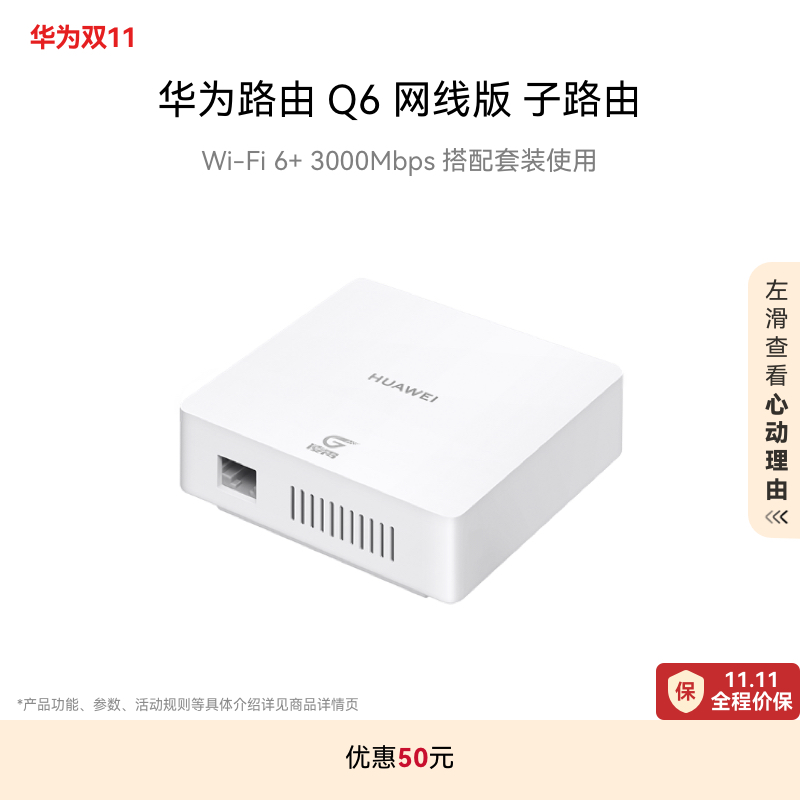如何选购适合自己的路由器:五大要点速览
观想沮
2024-10-14 06:00:52
0次
如何选购适合自己的路由器:五大要点速览
在数字化时代,一个性能出色的路由器对于家庭和工作场所的互联网连接至关重要。然而,市场上的路由器种类繁多,如何选购适合自己的路由器呢?下面我们将通过五大要点来帮助您快速了解选购路由器的关键。
一、明确需求
在购买路由器之前,首先要明确自己的需求。考虑家庭或办公场所的面积、设备连接数量、网络使用场景等因素。如果家庭面积较大或者需要连接的设备较多,建议选择具备更强信号覆盖能力和更高带宽的路由器。
二、品牌与质量
选择知名品牌和高质量的路由器是保证网络稳定性和性能的关键。知名品牌的路由器通常有更好的售后服务和更长的保修期,同时其硬件和软件也更加稳定可靠。
三、无线标准与频段
目前市场上的路由器主要支持802.11n、802.11ac和802.11ax等无线标准。其中,802.11ax(Wi-Fi 6)具有更高的传输速度和更好的设备兼容性。此外,双频段路由器可以同时支持2.4GHz和5GHz两个频段,提供更稳定的网络连接和更快的传输速度。
四、信号覆盖能力与天线设计
路由器的信号覆盖能力直接影响到网络连接的稳定性和速度。因此,在选购路由器时,要关注其信号覆盖范围和天线设计。一般来说,天线数量越多、信号覆盖范围越广的路由器表现更好。此外,如果家庭或办公场所存在多层结构或特殊布局,建议选择具备信号增强功能的路由器。
五、配置与价格
在考虑以上因素后,还需关注路由器的配置和价格。根据自己的需求选择合适的配置,如处理器性能、内存大小等。同时,不要盲目追求高配置而忽视价格因素,要根据自己的预算合理选择。
以上就是选购适合自己路由器的五大要点。接下来我们将这些要点翻译成英文:
How to Choose the Right Router for You: Five Key Points at a Glance
In the digital age, a high-performance router is crucial for internet connectivity in homes and workplaces. However, with a wide range of routers on the market, how can you choose the right one for you? Below, we will help you quickly understand the key factors to consider when purchasing a router through five key points.
First, define your needs. Consider factors such as the size of your home or office, the number of devices that need to be connected, and the usage scenario of your network. If you have a large home or need to connect many devices, it is recommended to choose a router with stronger signal coverage and higher bandwidth.
Second, consider the brand and quality. Choosing a well-known brand and high-quality router is essential for ensuring network stability and performance. Routers from well-known brands usually have better after-sales service and longer warranty periods, while their hardware and software are more stable and reliable.
Third, consider wireless standards and frequency bands. Currently, routers on the market mainly support wireless standards such as 802.11n, 802.11ac, and 802.11ax. Among them, 802.11ax (Wi-Fi 6) offers higher transmission speeds and better device compatibility. Additionally, dual-band routers support both 2.4GHz and 5GHz frequency bands, providing more stable network connections and faster transmission speeds. Fourth, consider signal coverage and antenna design. The signal coverage of a router directly affects network stability and speed. Therefore, when choosing a router, pay attention to its signal coverage range and antenna design. Generally, routers with more antennas and a wider signal coverage range perform better. Additionally, if your home or office has multiple floors or a special layout, it is recommended to choose a router with signal amplification capabilities. Fifth, consider configuration and price. After considering the above factors, pay attention to the router's configuration and price. Choose the appropriate configuration based on your needs, such as processor performance, memory size, etc. At the same time, do not blindly pursue high configurations while ignoring price factors. Select a router that fits your budget reasonably. These five key points will help you choose the right router for your needs. Remember to consider all factors and make an informed decision based on your specific requirements.下一篇:"路由器:网络安全的关键守护者"
相关内容
热门资讯
路由器的进化史:从有线到无线,...
路由器进化史:从有线到无线,再到智能路由器,科技发展推动了路由器的变革。这种变化为人们提供更便捷、高...
路由器市场大解析:2023年热...
路由器市场解析:2023年热门型号比较,竞争激烈。各大品牌如华为、小米、TP-Link和苹果推出各有...
"家用与商用路由器的区别及选择...
本文介绍了家用与商用路由器的区别,并提供了选择建议。家用路由器适合家庭用户,需关注稳定性和易用性;商...
路由器故障排查与解决:常见问题...
本文介绍了路由器常见问题及处理方法,包括无法联网、信号弱、无法登录管理界面、掉线及设备连接限制等问题...
"路由器技术解析:如何提升网络...
本文介绍了提升网络速度与稳定性的技术手段,包括硬件升级、信道优化、智能QoS等措施,通过增强天线信号...
路由器技术发展趋势与未来展望
摘要:
本文探讨了路由器技术的发展趋势与未来展望。随着硬件升级、软件定义网络和网络功能虚拟化、安全...
高速稳定:路由器技术解析与性能...
摘要:
本文详细解析了路由器技术,包括硬件和软件技术,并对不同路由器的传输速度、稳定性和信号性能进...
路由器使用技巧大放送:提升网络...
本文分享了提升路由器网络速度与稳定性的技巧,包括定期重启路由器、调整信道与频段、优化设备位置、使用更...
全面解析不同类型路由器的优缺点
本文解析了不同类型路由器的优缺点,包括家庭路由器、企业级路由器和无线路由器。每种路由器都有其特定应用...
"深度解析:路由器的关键参数及...
摘要:
本文深入解析了路由器的关键参数和功能,包括无线标准、频段、处理器和内存、端口数量和类型等,...


